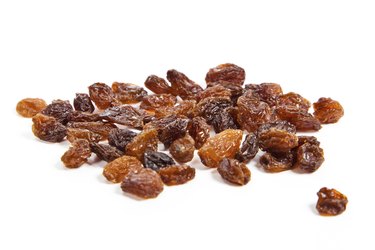
The quality of your diet plays a key role in your health, and setting a goal to gain weight isn't a license to eat anything you want. While eating any extra calories -- even ones from fast food, ice cream and other "junk" -- will result in weight gain, following a nutritious diet is a healthy way to add pounds to your frame while also meeting your nutritional needs. Raisins offer lots of nutritional benefits, and they're relatively high in calories, so they can work well in a weight gain diet.
Weight Gain, Calories and Raisins
Video of the Day
On its most basic level, weight gain is about calories in vs. calories out. Specifically, you'll need to eat 250 to 500 calories on top of what you already need to maintain your weight. This calorie surplus translates to 0.5 to 1 pound of weight gained each week.
Video of the Day
Raisins are a relatively concentrated source of calories, so they can help you reach your calorie surplus goals. A half-cup serving of seedless golden or regular raisins -- measured without packing -- supplies 218 calories. If you enjoyed a serving of raisins on top of your regular meal plan, you'll almost hit a 250-calorie surplus goal, even without making any other changes to your diet.
Healthful Benefits of Raisins
The best weight gain diets are made up of healthy foods, which ensures you're getting the nutrients you need -- like minerals and vitamins -- in addition to calories. As a good source of a few essential nutrients, raisins contribute nutritional value to your diet plan.
A half-cup serving of raisins -- golden or regular -- supplies 16 percent of your daily value for potassium. Potassium contributes to your body's electrolyte balance, which is important for the health of your muscles and nerves. Potassium also supports your cellular metabolism by helping your cells process carbohydrates.
Raisins also help ensure you get enough copper in your weight gain diet. Copper activates specific proteins, called enzymes, that allow your cells to function. Some copper-dependent enzymes play a role in brain health and nerve function, while others promote healthy connective tissue. A half-cup of regular raisins offers 12 percent of the daily value for copper, while an equal serving of golden raisins contains 13 percent.
Drawback of Raisins: Low Protein Content
While raisins are healthy, they fall short in one key nutrient -- protein. A half-cup serving of raisins contains 58 grams of carbohydrates but less than 3 grams of protein. Everyone needs protein in their diet -- its amino acid content helps with cell and tissue repair, supports your immunity and keeps your skin and connective tissues strong -- but it's especially important when you're trying to gain weight healthily. That's because building muscle requires extra protein, since you need more amino acids to assemble your new muscle tissue. As a result, strength trainers need double the protein of sedentary people -- 0.8 grams per pound of body weight, compared to 0.4 grams per pound for non-athletes -- explains the University of California, Los Angeles. Make sure you're eating healthy sources of protein -- like nonfat dairy, lean meats and fish, beans, eggs and nuts -- at other meals to ensure you're meeting your daily protein goals.
Serving Raisins for Weight Gain
You can boost the weight gain potential of raisins by serving them with sources of protein, so you'll get the nutritional benefits of raisins along with the muscle-building benefits of protein at each meal. Stir a handful of raisins into a container of nonfat Greek yogurt or cottage cheese, or use a few spoonfuls of raisins to add natural sweetness to chicken and tuna salad sandwiches or wraps. Use protein powder in place of flour to make high-protein raisin muffins, breads and pancakes, or add raisins to Morroccan-spiced chicken or curries for added calories, nutrition and flavor.
- McKinley Health Center: Gaining Weight the Healthy Way
- HealthAliciousNess: Nutrient Facts Comparison Tool (Raisins)
- McKinley Health Center: Macronutrients: the Importance of Carbohydrate, Protein, and Fat
- Linus Pauling Institute: Copper
- Linus Pauling Institute: Potassium
- UCLA: Bulking Up Commonly Asked Questions and Answers